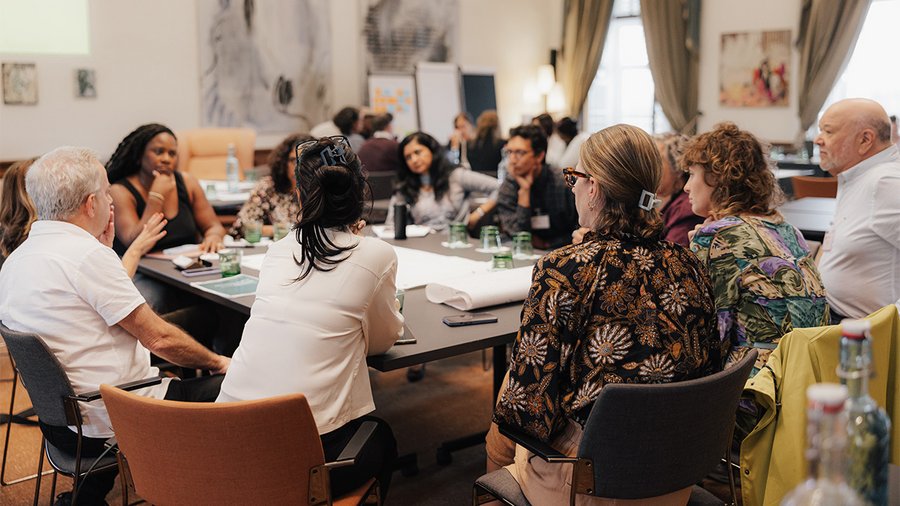Achieving equity in health science knowledge systems demands intentional, sustained, and non-linear action
Equity is not just a goal but a guiding principle for transforming health science knowledge systems. This principle was at the heart of the discussions when over fifty global leaders gathered at the Salzburg Global program on "Centering on Equity: Transforming the Health Science Knowledge System". Together, they envisioned a new trajectory for health knowledge systems: one that prioritizes equity, inclusivity, and diverse ways of knowing.
In his opening remarks, Alonzo Plough, the program chair and Vice President of Research-Evaluation-Learning and Chief Science Officer at the Robert Wood Johnson Foundation, highlighted the long-standing dominance of biomedical approaches in health science. He pointed out that while this focus has driven significant scientific advancements, it has also perpetuated systemic inequalities and marginalized other forms of knowledge. "To truly transform health knowledge systems, we must not only recognize these inequities but also actively disrupt the status quo," Alonzo emphasized.
A recurring theme throughout the program was the urgent need for a paradigmatic shift in health science to one that reimagines well-being as central to health, moving beyond the reductionist focus on disease. This shift requires embracing the holistic dimensions of health, including mental, social, nature and environmental well-being, and addressing systemic factors such as social determinants of health and integrating anti-racist approaches for health equity. These discussions also emphasized the need to decolonize health science by shifting mindsets and embracing multiple knowledge sources beyond conventional biomedical frameworks.
"Whose knowledge is valued and why, and how do we decolonize health science knowledge systems?"
A central question resonated throughout the sessions: Whose knowledge is valued and why, and how do we decolonize health science knowledge systems? Participants discussed how recognizing the value of Indigenous knowledges can lead to more inclusive and sustainable health and wellbeing solutions while moving away from the extractive practices that often marginalize these communities.
Part of that change will require a narrative shift. By examining the shortcomings of dominant western biomedical science, it is imperative to fully recognize and value the diverse ways in which communities produce and validate knowledge within their unique social, cultural, and historical contexts.
Throughout the program, there was a powerful call for knowledge pluralism and epistemic justice by embracing the richness of multiple knowledge systems, from Indigenous practices, traditional and complementary medicines, and nature-based healing systems to non-mainstream approaches such as "Buen Vivir" ("good living"), which offers a concept and framework for wellbeing based on harmony between humans and nature. This inclusive approach is crucial for building equity-centered health systems that genuinely value all forms of knowledge and the health of all living beings.
As César Abadía, Associate Professor at Red SaludPaz in Colombia, who conducts research with Indigenous and peasant Amazonian communities on "Buen Vivir", noted, “Sometimes, we need to step back and let the communities and those who hold the knowledge take the lead. If it is different, let it exist.” He emphasized that the challenge lies in moving away from colonial mindsets that impose frameworks to quantify and measure Indigenous knowledge. Instead, "we must allow these practices to be understood and valued on their own terms."
"Community must always be at the center of health equity"
Rocío Sáenz, Executive Director of Health Equity Network of the Americas in Costa Rica, stressed that community collaboration is essential for this transformation. “If we want health equity,” Rocío explained, “we must radically change how we involve and integrate community engagement.” She called for an urgent shift toward empowering communities through genuine partnerships - moving beyond tokenistic gestures or top-down approaches, and instead, co-creating solutions with communities. This approach ensures that communities are not just participants in the conversation but active, equal contributors in shaping the policies and solutions that directly affect them.
However, as Tina D. Purnat, Prajna Leadership Fellow and DrPH Student at Harvard TH Chan School of Public Health, highlighted, “our understanding of ‘community’ and ‘knowledge’ needs to evolve to consider modern digitized societies. Communities are not homogeneous groups; they contain diverse, intersecting identities, many of which remain marginalized. Both online and offline environments shape communities, and evolving knowledge production methods to capture their needs, particularly in digital spaces, is essential for equity-centered public health in the 21st century. We must not overlook the potential of digital spaces to engage communities in shaping the questions we ask, the evidence we collect, and the solutions we design and implement. Technology can broaden participation in health knowledge production beyond data collection by elevating voices at scale and empowering communities to drive evidence creation and policy design in meaningful ways.”
"Achieving equity in health science knowledge systems demands intentional, sustained, and non-linear action"
The collective consciousness throughout the program made it clear that achieving equity in health science knowledge systems demands intentional, sustained, and non-linear action. This transformation requires dismantling neocolonial and exploitative structures that perpetuate systemic inequities through redistributing power and resources, fostering ethical partnerships, and addressing the social and structural determinants of health. By doing so, we can reimagine health science as a powerful tool for equity - one that actively supports the well-being of all communities.
As James Doucet Battle, Associate Professor of Sociology and Co-Director of the Science and Justice Research Center at the University of California noted, “Through these multi-layered dialogues, we have taken an important first step toward transformation. Its success will depend on sustained collaboration, recognition of pluralistic knowledge systems and our collective commitment to centering equity and advancing decolonization efforts in everything we do.”
The Salzburg Global program on "Centering on Equity: Transforming the Health Science Knowledge System" was held from October 7 to 12, 2024. Support for this program was provided by the Robert Wood Johnson Foundation. The views expressed here do not necessarily reflect the views of the Foundation.


